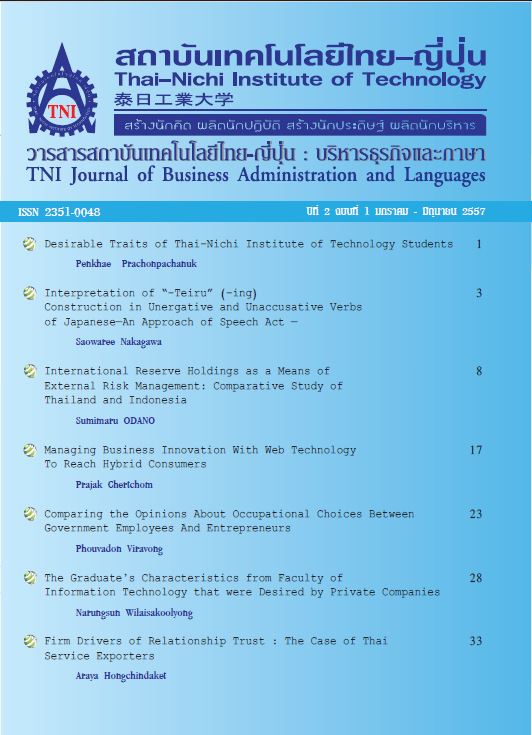Comparing the opinions about occupational Choices between government employees and entrepreneurs
Main Article Content
Abstract
The objective of this research is to study about the opinions of government employees and entrepreneurs in Vientiane, Lao P.D.R. about their occupational choices, by studying the factors that influence them while choosing their occupation, job satisfaction and opinions about starting a business. This research has surveyed 112 government employees and entrepreneurs in Vientiane. The findings of this study are that social recognition is the most important factor in choosing an occupation for both government employees and entrepreneurs, while income is very important for entrepreneurs but not important for government employees. Personal preference is more important for entrepreneurs than for government employees. Education achievements, parents’ influence and career’s potential growth are important for both government employees and entrepreneurs. The findings about job satisfaction are similar for both groups; i.e., they have a high level of satisfaction in their job, and the only difference is that government employees are not satisfied about their salary or income. Most of the government employees want to start their own business in the future and they think that money, customer and education are the most important factors in doing business, while entrepreneurs think that money, customer and economic situation are the most important factors.
Article Details
Article Accepting Policy
The editorial board of Thai-Nichi Institute of Technology is pleased to receive articles from lecturers and experts in the fields of business administration, languages, engineering and technology written in Thai or English. The academic work submitted for publication must not be published in any other publication before and must not be under consideration of other journal submissions. Therefore, those interested in participating in the dissemination of work and knowledge can submit their article to the editorial board for further submission to the screening committee to consider publishing in the journal. The articles that can be published include solely research articles. Interested persons can prepare their articles by reviewing recommendations for article authors.
Copyright infringement is solely the responsibility of the author(s) of the article. Articles that have been published must be screened and reviewed for quality from qualified experts approved by the editorial board.
The text that appears within each article published in this research journal is a personal opinion of each author, nothing related to Thai-Nichi Institute of Technology, and other faculty members in the institution in any way. Responsibilities and accuracy for the content of each article are owned by each author. If there is any mistake, each author will be responsible for his/her own article(s).
The editorial board reserves the right not to bring any content, views or comments of articles in the Journal of Thai-Nichi Institute of Technology to publish before receiving permission from the authorized author(s) in writing. The published work is the copyright of the Journal of Thai-Nichi Institute of Technology.
References
Anousakoun, S., 2005. Job Satisfaction of Public Employee in Doisaketh District, Chiangmai Province. Chiangmai University.
Donald E. Super, 1963. Career Development: Self-Concept Theory, New York: College Entrance Examination Board.
Enterprise Development Consultants Co., Ltd., 2002. Study on Generating Employment through Micro and Small Enterprise and Cooperative Development in Lao PDR, International Labor Office.
Ham, R., Junankar, P.N. and Wells, R., 2009. Occupational Choice: Personality Matters, IZA Discussion Paper No. 4105.
Herzberg, F. 1959. The Motivation to Work, New York: John Wiley and Sons.
John L. Holland, 1973. Making Vocational Choices: A Theory of Careers, Englewood Cliffs, N. J: Prentice, Hall.
Seanhan, S., 2005. Job Satisfaction of Basic Education Employee in Area 2, Lampoon Province. Chiangmai University.


